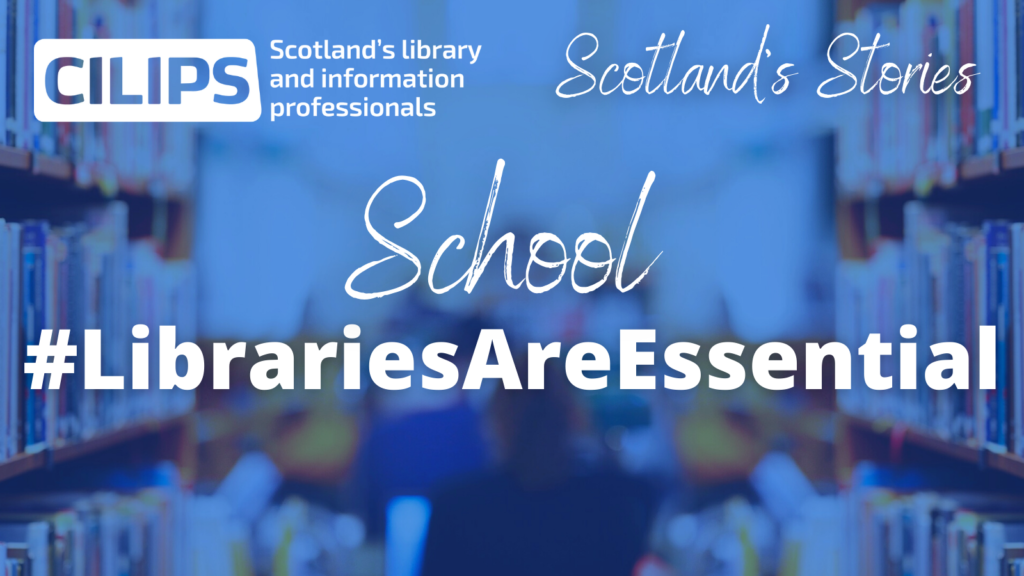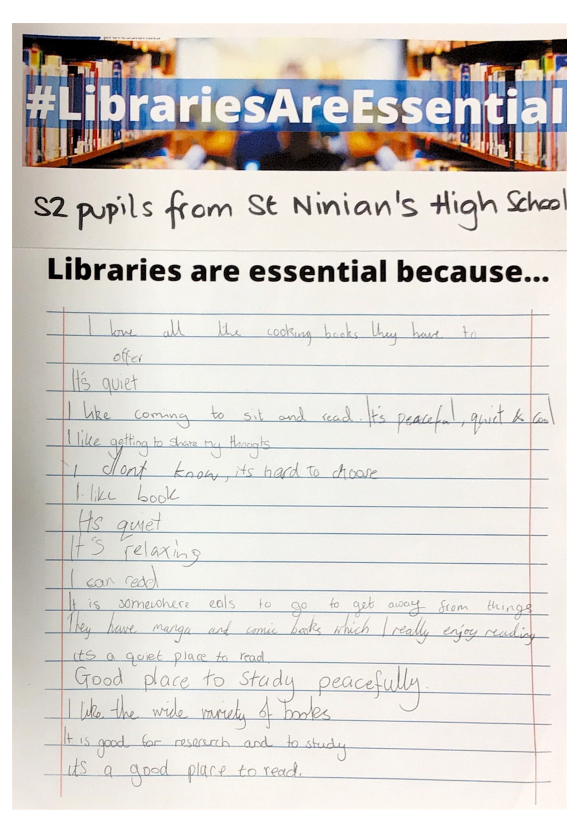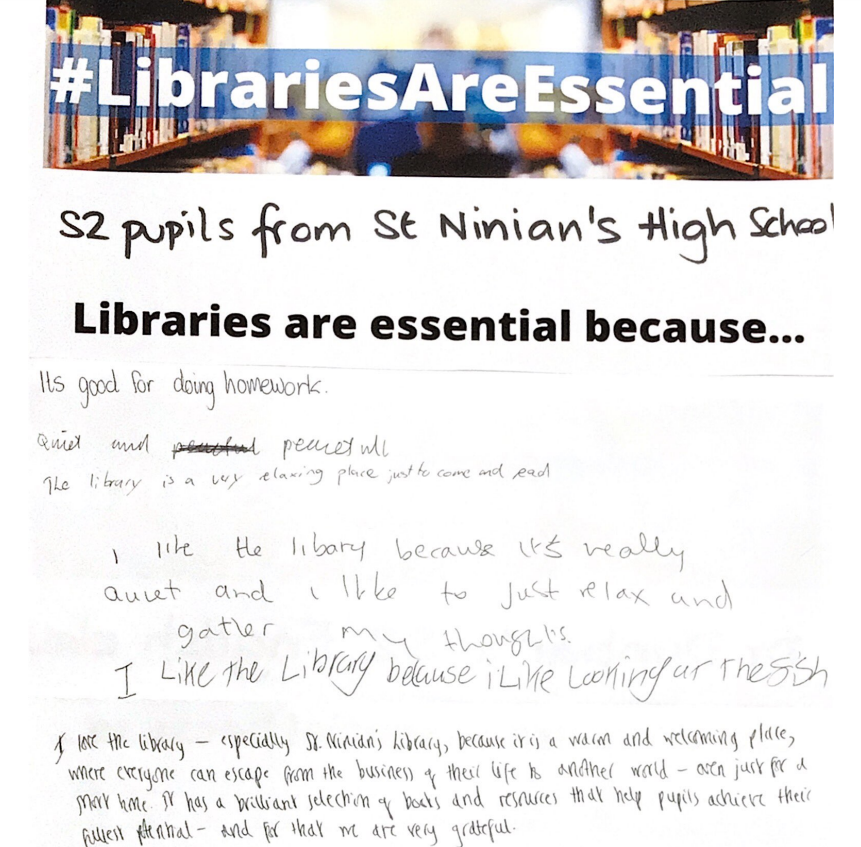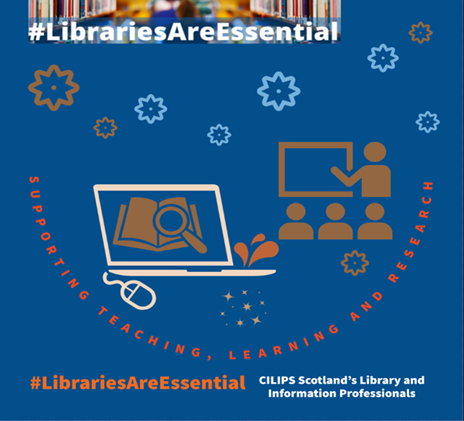

- ‘It is somewhere to go to get away from things…’ ‘I like getting to share my thoughts…’ ‘a warm and welcoming place where everyone can escape from the busyness of life to another world…’ When School Librarian and SLG Scotland Vice-Chair Pamela McLean asked S2 pupils from St Ninian’s High School why #LibrariesAreEssential to them, their community of young library lovers had lots of fantastic ideas. Click here to download the template and share your stories too!

- ‘School libraries empower and educate; they provide equality of access and they provide support for young people in their lifelong learning… They provide a safe space to think, to create, to share, to grow and to read. They are the hub of learning and the favourite place for many pupils.’ Shelagh Toonen, Chair of SLG Scotland and Library and Information Professional of the Year 2018, shares why school libraries are essential to Scotland’s story: past, present and future. Read on…
- From creative climate fiction to hidden cover contests and much more, Scotland’s school librarians made the most of World Book Day to inspire and engage our nation’s young people with stories. Find out what our spectacular SLG Scotland committee planned for the big day…
- ‘In challenging times, many parents are looking for an activity that supports their children’s well-being. And as reading is also linked to strong literacy benefits, connecting them with books, with the support of their school librarian, is a smart way to go.’ Dr Margaret Kristin Merga tells our friends at Facet Publishing why school #LibrariesAreEssential to encouraging empathy, sharing stories and much more.
- ‘One student said to me recently “I love these books as I can see myself in them”, and I feel this authentic feedback helps validate the approach I’ve been taking…’ School librarians play a pivotal role in ensuring that Scotland’s young people can access books, both fiction and non-fiction, that truly represent their identities and experiences. Read more in this brilliant blog by school librarian Stephen Leitch about the strategies he used to create and promote an LGBT book collection in his library.
- ‘The concept behind my escape room was quite simple: a pupil wakes up in the library and finds themselves locked in. To escape, they need to work through a series of puzzles based upon my library induction, with a little help from my (imaginary) grump, cloven-hooved library assistant: shelving, library sections, the digital library, and some fake news…’ School Librarian Derek France created digital escape rooms as a P7 transition activity during lockdown. Learn more here (but be warned, you might just find yourself locked in a library)!
- ‘This is a fantastic opportunity to demonstrate the skills that librarians have and can share with our young people, teaching them core skills that they can use throughout their school career and take with them to further education…’ Learning Community Librarian Gillian Gillespie shares why School #LibrariesAreEssential to embedding information literacy into the curriculum.
- ‘Engaging in two or three reading activities, on average, increases the pupil’s GCSE score by between seven and nine points… The size of this effect should not be overlooked since an extra GCSE pass at grade A* is worth eight points.’ 2022 research published in the British Journal of Sociology of Education advised English schools to ‘concentrate on increased reading activities’ to support with lower projected GCSE outcomes, with library visits as well as reading for pleasure and discussing books at home all cited as positive examples.
- ‘You see the difference the school library can make in your students’ and teachers’ lives. All headteachers should know that their school library is a powerful tool. And school libraries should be available to all students and teachers – not just a select few.’ School libraries independent adviser and CILIP Fellow Elizabeth Hutchinson vividly evokes the essential role of the school library in attainment, achievement and wellbeing for students and staff alike in this article for TES (The Times Educational Supplement).
- Elgin Academy’s Lockdown Book Clubs gave students and staff a chance to continue sharing their love of reading despite lockdown, as well as an essential opportunity for engagement even when physically away from school. Read the case study.
- Shetland School Libraries likewise refused to let the pandemic stop their essential work in promoting learning and literacy, and they also offered much-needed support to vulnerable young people during lockdown. Read the case study.
- School Libraries Group Scotland brought courage and creativity to their pandemic response, working together virtually to devise new ways of supporting their school communities. In this blog, SLGS committee member Markie DeLeavey pulled together a comprehensive list of resources for school librarians across Scotland – it proved very popular on Twitter too!
- Our talented SLGS committee members have also created a series of blogs and videos to highlight essential tools for school librarians – see all those posted so far!
- ‘Libraries, and in particular school libraries, are essential for supporting families, children and young people as they develop literacy and research skills. These skills unlock all learning and are skills for life. Libraries are also crucial information hubs, providing access for all families to help and support in their own communities. As places where anyone can go, libraries – and especially school libraries – can represent a safe haven, a managed space for peace, quiet and learning.’ Connect: supporting partnerships in education (Scottish Parent Teacher Council) shares several reasons why school libraries are so essential. Read on…
- Vibrant Libraries, Thriving Schools – a National Strategy for School Libraries in Scotland 2018-2023 notes that school librarians ‘play a key role in supporting the next generation of critical thinkers, enthusiastic readers and empowered individuals’. School libraries ‘have the potential to be transformative in the development of every child and young person,’ the strategy states, and ‘a strong school library service can have a powerful and positive impact on pupils, teachers, families and the wider community’ (p6). School librarians support pupils at every stage of their school journey, including with ’employability skills… writing UCAS statements and preparing for interviews’ (p15). Pupils themselves report that ‘having a space out with the classroom to explore skills and interests has a positive impact’ on their learning.
- The primary and secondary school libraries of Hazlehead School in Aberdeen have a particular focus on supporting P7 pupils who will soon be transitioning to secondary (p17). The primary library is staffed by a school librarian, assisted by S6 pupils as well as parent volunteers, and introducing P7 pupils to the secondary school library early emphasises that it is a ‘fun, safe and creative’ space.
- Richard Gerver, an award-winning teacher who transformed the once-failing Grange Primary School in Long Eaton and won ‘School Head Teacher of the Year’, says that ‘one of the first things I did’ was to build a ‘state-of-the-art purpose-built library with staff receiving full school library CPD training; the result proved my belief in the transformative power of libraries’. He argues that school libraries are essential to inspiring a love of reading in children (with those who do enjoy reading three times more likely to have good mental health than their non-reading peers) as well as providing guidance in critical information skills, teaching children ‘who aren’t yet highly discerning about the information they consume’ the essential skill of understanding what is ‘reliable and safe’.
- Pupil-led activities like a Book Quiz, a World Book Day ‘Design Your Own Character’ competition, making origami bookmarks and sharing reading recommendations let the Holyrood Secondary School community stay connected with its library both online and in-person, despite the tricky circumstances created by Covid-19. Read the case study.
- Prior to lockdown, the North Ayrshire Libraries Learning Team visited local schools for ‘Digidabble’ sessions: providing access to tablets, digital toys and coding equipment for children in P1-5. Digidabble gives pupils ‘the opportunity to try out new digital devices in a creative way, with experienced digital practitioners on hand to assist them and the teachers’. According to Vibrant Libraries, Thriving Schools, ‘having informed and knowledgeable staff facilitating the digital sessions meant that the pupils could spend time learning about new devices, play with ones they were most interested in, and learn new STEM skills’ (p19).
- The community centre at Alford, Aberdeenshire is made up of a primary school, secondary school, library and public leisure facilities. The Network Librarian at Alford Library worked with the Learning Support Department to devise a literacy initiative for pupils with Additional Support Needs, using the school library as ‘a relaxed learning environment for reluctant readers’ in which they could read and present aloud. ‘The gradual improvement in the pupils’ reading ages was clear, and their attitudes and engagement with learning improved. There was a clear impact on the wellbeing of the pupils, who were visibly more relaxed and comfortable in this type of learning space.’ (p27).
- The school librarian of St Joseph’s Academy received funding from the SLIC School Library Improvement Fund for a collaborative project that now involves eight secondary schools across East Ayrshire. Mental Health First Aid kits introduce pupils to resources designed to promote good mental health and, with support and advice from their school librarians, this initiative helps to equip pupils with the tools they need for short-term management of mental health challenges they might be facing (p28).

Graphic kindly created by Xiaowei Jie



